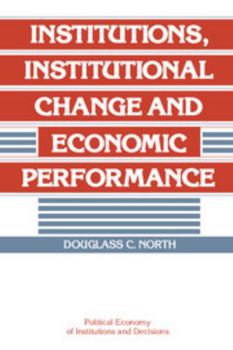Institutions, Institutional Change and Economic Performance
(Part of the Political Economy of Institutions and Decisions Series)
Select Format
Select Condition 
Book Overview
Continuing his groundbreaking analysis of economic structures, Douglass North develops an analytical framework for explaining the ways in which institutions and institutional change affect the... This description may be from another edition of this product.
Format:Paperback
Language:English
ISBN:0521397340
ISBN13:9780521397346
Release Date:October 1990
Publisher:Cambridge University Press
Length:159 Pages
Weight:0.57 lbs.
Dimensions:0.6" x 6.0" x 8.9"
Customer Reviews
5 ratings
Economic excellence
Published by Thriftbooks.com User , 16 years ago
This is a really good and insightful book for anyone interested in economics, especially as it relates to determining factors in economic growth. In about 150 pages, North presents an interesting and thought provoking theory of economic growth.
The Perfect Introduction to "New Institutional Econonomics"
Published by Thriftbooks.com User , 16 years ago
Douglass North is an excellent writer, and this book is the amazing culmination of a lifetime's work in the area known as New Institutional Economics. This school or tradition is concerned with the role institutions play in the functioning of economies, and in particular, how they influence economic performance. Institutions are defined as rules or constraints, both informal (social conventions, habits, norms, etc.) and formal (legal rules and regulation), on human behavior. Rules, however, only provide the framework for action, and it is here where Douglass North brings in "organizations", which are responsible for determining the ways in which those "rules" become articulated, accepted (internalized) and enforced. A lot is covered in this book, but some general themes and arguments can be gleaned from the very short and immensely accessible number of pages. Perhaps most importantly, North argues in this book that conventional concepts like economic efficiency, cooperation, perfectly defined and costlessly enforced property rights, "frictionless exchange", costless information, and economic rationalism are by no means "given" in the standard economic modeling framework. These all depend on the "stability" of the institutions that exist in society. Stability, in turn, also depends on the ability of the agents responsible for measurement and enforcement to reduce transaction costs so that economic performance can be improved. This itself is by no means "given", because the State (the agent commonly assigned the task of enforcement) typically acts in ways that make property rights less secure, and hence raises transaction costs. If all of this sounds interesting, then Douglass North's book is perhaps the best source to consult on these matters. His prose is eminently readable, and he is a pleasure to follow as he tells his story in fascinating detail. I have explored other books that deal with similar topics, but I still regard this book as the most edifying.
Most comprehensive book ever
Published by Thriftbooks.com User , 20 years ago
Douglass North is an amazing writer. If you are purchasing this book, you probably already know what this book is about and its impact. This book, I would argue is largely responsible for his receiving the Nobel Prize in 1993.His new-institutionalist view links together history, economics, political science, sociology, and every other social science. This book truly inspired me to specialize in institutional economics. Every social issue can be approached from the institutional perspective, namely that institutions determine actions and the market determines institutions. Though my professors are all old institutionalists, they agree this is the best book by far on the subject and most research papers in the subject thus reference this book.For more information on New Institutional Social Science, visit the website at http://cniss.wustl.edu/people.html
OBVIOUS IN RETROSPECT, WHICH MAKES IT EVEN MORE OUTSTANDING
Published by Thriftbooks.com User , 21 years ago
In this book, North outlines the precise features of the neo institutional economics school, which includes Coase, Williamson, Olson, Fogel, among others. This book is mainly about the theory itself and its origins and features, not about applications in particular, though the author does address that issue at the end of the book in the section about eocnomic performance. I believe this book is great reading for the literate economist. It is difficult to follow for the non-economist, which I believe North focuses on in his other book, "Structure and Change in Economic History". That work is earlier and I believe not as complete, but it is much more readable. Either way, North's work is among the most important advances in economics in the 20th century (for which he got the Nobel Prize), so knowledge of it should benefit one and all.
Excellent overview of new institutional economics
Published by Thriftbooks.com User , 25 years ago
If you ever wondered what new institutional economics is all about take this book. While it may be helpful to have an economics background the content is accessible to a wider audience. It is an absolute must for everyone who is interested in the interaction of political, social, cultural, religious, and historical elements in economic growth and policy. As a former student of North I love coming back to this book and everytime you get something new out of it.





